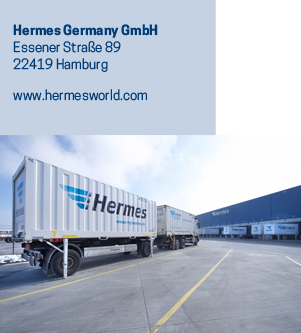When ISO 14001 first appeared in 1996, the target group was more likely to be in the manufacturing industry. However, the environmental standard has long played an important role for service providers as well, for example in the rapidly growing parcel delivery industry. Hermes Germany, the leader in German private customer shipping, recognized this 20 years ago. Read more about the company and their experience with ISO 14001.

Hermes Germany, headquartered in Hamburg, Germany, focuses on national and international parcel delivery and the handling of upstream flows of goods worldwide. In Germany, Hermes has the largest national network in European private customer shipping. Since 1999, the company's environmental management system has been certified by the DQS according to ISO 14001. Dr. Georg Barth is Hermes' environmental management officer. In the following interview, he talks about his experience with ISO 14001 and the benefits the company derives from it.
Interview with Dr. Georg Barth
Dr. Barth: Hermes has been certified by DQS to ISO 14001 for over 20 years. Why does Hermes need an environmental management system?
Environmental protection is firmly anchored in Hermes' DNA and is a central factor for successful business in the long term. Through our environmental management system (EMS), we can ensure that we meet our own requirements and the expectations of our interested parties. Particularly in the case of a broadly defined cross-cutting issue such as environmental protection, a management system provides us with the necessary structure to define and effectively monitor and control the multitude of environmentally relevant responsibilities, processes, key figures and measures. The continuous improvement process approach is very important to us.
The environmental management system has been firmly anchored in our company since 1999 and it is impossible to imagine our operations without it.
At the end of 2017, you switched to the then new version if the standard, ISO 14001:2015. How did you identify your relevant interested parties, which ones are particularly relevant and what needs do they have with regard to your EMS?
In a workshop with representatives of the individual business units, we jointly identified the relevant stakeholders in order to satisfy the standard requirement from Chapter 4.2. The most important stakeholders include our employees, contractual partners, clients, end customers, the Otto Group as our parent company, as well as the press, local authorities and administrative bodies. One expectation that connects all stakeholders is transparent communication about our significant environmental impacts and the environmental goals and measures we have specified. We are expected to continuously improve our environmental performance.
ISO 14001 - Sustainable environmental management
Certified environmental management system in accordance with recognized standard ★ Improve environmental performance and minimize risks ★ Operate responsibly and sustainably ★
In Chapter 5.2, ISO 14001 requires top management to commit to protecting the environment as part of its environmental policy, and explicitly mentions "preventing environmental impacts" - how does Hermes implement this in its day-to-day business?
One of the many examples in which this commitment is reflected is our Bluefield infrastructure program, in which we are investing a total of 300 million euros in new site construction and modernization. We have all new buildings certified to the Gold Standard for sustainable construction of the DGNB e. V. (German Sustainable Building Council). When modernizing, we invest in energy efficiency and new conveyor technology, LED lighting and CHP (combined heat and power) plants. We obtain 40% of the electricity required at our sites from the Green Electricity Label. This is a particularly high-quality green electricity label supported by environmental associations such as NABU and BUND. Overall, we have been able to reduce the specificCO2 emissions of our logistics sites by 50% since 2006.

What experience do you have with emergency situations? Chapter 6.1.1 of the standard calls for their identification, especially with regard to possible environmental impacts. Which kinds of emergency situations are conceivable at Hermes?
As an emergency scenario with a possible environmental impact, fuel and oil leaks in the event of accidents on the company premises are relevant, for example. For this purpose, each site has defined an emergency plan for accidents with leakages, which regulates the reporting chain and technical countermeasures. Protective equipment, binding agents and suction hoses are kept on hand as immediate countermeasures. Building fires are also an emergency scenario with environmental impact. We are prepared for emergencies through defined fire protection regulations and emergency plans, training of fire protection assistants, fire protection instruction of employees, and fire protection and evacuation drills.
Let's move on to the certification of your environmental management system - do you remember what tipped the scales in favor of DQS as a certification partner back then?
From our perspective at that time, an important point was that DQS offered certification according to the so-called DQS-TIP ("Trust Improvement Program"). This program was developed for particularly committed companies. Compared to the requirements of ISO 14001, this places an extended focus on the evaluation of internal audits by the certifier. To this day, we feel that we are in very good hands with DQS.

Certification according to ISO 14001
How much effort do you have to expect for ISO 14001 certification? Find out without obligation and free of charge.
What was your experience with our team of auditors during the last (certification) audit with regard to ISO 14001?
Among other things, it was important for us that the DQS auditors again identified concrete starting points for improving the management system in the most recent certification audit, which we are now examining for possible implementation. One exciting topic here, for example, was new software that enables vans of up to 3.5 metric tons to use web-based telematics services. From an environmental point of view, this opens up new possibilities for monitoring and analyzing fuel consumption in our van fleet.
If we look again at your environmental management system - what are your plans for the near future?
In February 2020, the Otto Group set the goal of becoming climate neutral by 2030, as far as possible without the commonnly usedCO2 compensation. As the group logistics provider for the Otto Group's retail companies, Hermes plays a central role in this. Therefore, we will increasingly focus on electromobility. We have already entered into a strategic partnership for electromobility with Mercedes-Benz in 2017, among other things with the aim of testing pre-series models in practical use and developing them to series maturity.

In 2019, we took delivery of the first e-vans for parcel delivery. By 2025, we want to add a total of 1,500 e-vehicles to our fleet. In Hamburg, Berlin and Leipzig, we are testing delivery with cargo bikes and micro depots to find out under which circumstances conventional delivery vehicles can be replaced. In the long run, we are looking at how we can expand the use of long trucks up to 25.25 m, which also has the potential to cut CO2 emissions.
Dr. Barth, thank you for the interesting interview.

HERMES GERMANY - Facts and figures
Hermes is an international trade and logistics service provider based in Hamburg. Hermes Germany is one of twelve companies in the internationally active Hermes Group, which belongs to the Otto Group.
The range of services offered by the companies operating under the Hermes brand covers globally demanded services along the retail value chain - from transport, including imports and exports, to fulfilment and parcel services, right through to two-man handling.
DQS - Your certifier
Today, economic success and environmental protection are equally important corporate goals for successful companies. Experience shows: Systematic, professional environmental management in accordance with the internationally recognized ISO 14001 standard helps them to sustainably pursue their goals and continuously improve operational environmental performance.
Do it like Hermes Germany and enter into dialog with us, e.g. in one of our upcoming workshops on environmental management.
Expertise and trust
Our more than 25 years of experience with ISO 14001 - DQS received their accreditation when the standard was first published in 1996 - make us your competent partner when it comes to certification.
Our texts and brochures are written exclusively by in-house standards experts and long-standing auditors for management systems. If you have any questions for the author or about our services, please feel free to contact us.
DQS Newsletter
Andreas Voelkerding
Expert and project manager at DQS for the transport and logistics sector. Andreas Voelkerding is responsible for numerous industry-specific standards, including TAPA FSR/TSR/PSR, GDP and TfS. As an auditor, his many years of experience are in demand both nationally and internationally, especially in logistics, air and sea freight.


